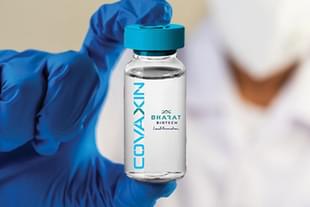News Brief
Covid Vaccine Cocktail: Bharat Biotech To Test Covaxin-American Intranasal Candidate Combination In India
Bhaswati Guha Majumder
Jul 31, 2021, 03:17 PM | Updated 03:17 PM IST
Save & read from anywhere!
Bookmark stories for easy access on any device or the Swarajya app.


India plans to test a combination of its own Covid-19 vaccine, Bharat Biotech’s Covaxin, and a prospective intranasal vaccine developed by researchers from the United States, in the hopes of boosting the two vaccines' protective efficiency against coronavirus infection.
A clinical trial involving Covaxin as the first dose on day zero and the candidate intranasal vaccine based on a chimpanzee adenovirus as the second dose on day 28 has been approved by an expert panel with India's regulatory body for medicines and vaccines.
The makers of India’s first home-grown Covid-19 vaccine from Hyderabad, Bharat Biotech, plans to conduct a trial combining Covaxin with the intranasal candidate vaccine developed by Michael Diamond and his colleagues at Washington University School of Medicine in St Louis, that the company obtained last year under a licensing agreement.
Covaxin, like other intramuscular injections, boosts systemic immunity, while intranasal vaccine administration stimulates mucosal immunity.
Bharat Biotech hopes that the two vaccines will boost the protective efficacy against Covid-19 through distinct methods.
In 2020, the intranasal candidate developed by the researchers from the United States was the first of Covid-19 vaccine candidates to show promise of “sterilising immunity,”— which is a sort of response that restricts the novel virus from generating an infection.
Bharat Biotech is currently conducting an independent trial in 175 volunteers at four sites — All India Institute of Medical Sciences in Patna, Apollo Hospital in Chennai, St Theresa's Hospital in Hyderabad, and the Gillurkar Hospital in Nagpur — to find out the safety and immune responses triggered by the intranasal candidate.
The intranasal candidate will be tested as a single dose and a double-dose vaccine in the trial.
Following a presentation by the Hyderabad-based pharmaceutical company, on 29 July, an expert panel of the Central Drugs Standard Control Organisation (CDSCO) approved the trial of the cocktail.
According to the researchers, the decision to combine Bharat Biotech’s vaccine with the intranasal candidate was motivated by the hope that the combination of systemic immunity from Covaxin and mucosal immunity from the intranasal vaccine would provide superior protection against SARS-CoV-2 infection.
However, the subject expert committee of CDSCO has recently suggested a trial of the Covaxin and Serum Institute of India’s Covishield (Indian version of Oxford-AstraZeneca jab) cocktail.
According to reports, Christian Medical College in Vellore intends to pursue this research, which will begin soon on 300 healthy participants.
In terms of cocktail jab, the World Health Organization's chief scientist Soumya Swaminathan earlier said that mixing and combining Covid-19 vaccines from different manufacturers is a "dangerous trend" as there is not enough data.
She said: "It's a little bit of a dangerous trend here. We are in a data-free, evidence-free zone as far as mix and match. It will be a chaotic situation in countries if citizens start deciding when and who will be taking a second, a third and a fourth dose."
In India, while some experts claimed that mixing vaccines — Covaxin and Covishield — is theoretically possible, the Niti Aayog member (health), VK Paul, said in May that more studies are required to recommend the mixing of vaccines.
Several studies on the mixing of vaccinations are being undertaken as several countries have already started their vaccination programmes. For a trial, Oxford-AstraZeneca and Pfizer were mixed, while the Russian jab Sputnik V was also blended with the Oxford-Astrazeneca’s vaccine and no major side effects were reported.





